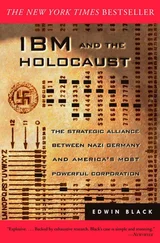Edwin Black - War Against the Weak
Здесь есть возможность читать онлайн «Edwin Black - War Against the Weak» весь текст электронной книги совершенно бесплатно (целиком полную версию без сокращений). В некоторых случаях можно слушать аудио, скачать через торрент в формате fb2 и присутствует краткое содержание. Город: Washington, DC, Год выпуска: 2012, ISBN: 2012, Издательство: Dialog Press, Жанр: История, на английском языке. Описание произведения, (предисловие) а так же отзывы посетителей доступны на портале библиотеки ЛибКат.
- Название:War Against the Weak
- Автор:
- Издательство:Dialog Press
- Жанр:
- Год:2012
- Город:Washington, DC
- ISBN:1-56858-258-7
- Рейтинг книги:3 / 5. Голосов: 2
-
Избранное:Добавить в избранное
- Отзывы:
-
Ваша оценка:
- 60
- 1
- 2
- 3
- 4
- 5
War Against the Weak: краткое содержание, описание и аннотация
Предлагаем к чтению аннотацию, описание, краткое содержание или предисловие (зависит от того, что написал сам автор книги «War Against the Weak»). Если вы не нашли необходимую информацию о книге — напишите в комментариях, мы постараемся отыскать её.
War Against the Weak — читать онлайн бесплатно полную книгу (весь текст) целиком
Ниже представлен текст книги, разбитый по страницам. Система сохранения места последней прочитанной страницы, позволяет с удобством читать онлайн бесплатно книгу «War Against the Weak», без необходимости каждый раз заново искать на чём Вы остановились. Поставьте закладку, и сможете в любой момент перейти на страницу, на которой закончили чтение.
Интервал:
Закладка:
About the time Darwin, Spencer and Mendel began explaining the heredity of lower species, Galton was already looking beyond those theories. He began to discern the patterns of various qualities in human beings. In 1865, Galton authored a two-part series for Macmillan Magazine that he expanded four years later into a book entitled Hereditary Genius. Galton studied the biographical dictionaries and encyclopedias, as well as the genealogies of eminent scholars, poets, artists and military men. Many of them were descendants of the same families. The frequency was too impressive to ignore. Galton postulated that heredity not only transmitted physical features, such as hair color and height, but mental, emotional and creative qualities as well. Galton counted himself among the eminent, since he was Darwin’s cousin, and both descended from a common grandfather. 29
Galton reasoned that talent and quality were more than an accident. They could be calculated, managed and sharpened into a “highly gifted race of men by judicious marriages during several consecutive generations.” Far from accepting any of Malthus’s notions of inhibited procreation, Galton suggested that bountiful breeding of the best people would evolve mankind into a superlative species of grace and quality. He actually hoped to create a regulated marriage process where members of the finest families were only wed to carefully selected spouses. 30
Galton did not worry that inbred negative qualities would multiply. He said there was “no reason to suppose that, in breeding for the higher order of intellect, we should produce… a feeble race.” He explained his own incapacitating physical frailties away as a manifestation of hereditary distinction. “Men who leave their mark on the world,” wrote Galton, “are very often those who, being gifted and full of nervous power, are at the same time haunted and driven by a dominant idea, and are therefore within a measurable distance of insanity.” 31
Galton struggled to find the pattern, the predictability, the numerical formula that governed the character of progeny. Mathematics would be the key to elevating his beliefs from an observation to a science. He didn’t have the answer yet, but Galton was certain that the secret of scientific breeding could be revealed-and that it would forever change humankind. “Could not the undesirables be got rid of and the desirables multiplied?” he asked. 32
In 1883, Galton published Inquiries into Human Faculty and Development and created a new term for his discipline. He played with many names for his new science. Finally, he scrawled Greek letters on a hand-sized scrap of paper, and next to them the two English fragments he would join into one. The Greek word for well was abutted to the Greek word for born. 33
In a flourish, Galton invented a term that would tantalize his contemporaries, inspire his disciples, obsess his later followers and eventually slash through the twentieth century like a sword. The finest and the fiendish would adopt the new term as their driving mantra. Families would be shattered, generations would be wiped away, whole peoples would be nearly erased-all in the name of Galton’s word. The word he wrote on that small piece of paper was eugenics. 34
Eugenics was a protoscience in search of vindicating data. Galton had described the eugenically well-born man as a trend in science, but he desperately sought to quantify the biological process. After all, if Galton could advance from merely discovering the scientific mechanism controlling human character to actually predicting the quality of the unborn, his knowledge would become almost divine. In theory, the master of any enforced eugenics program could play God-deciding who would be born and who would not. Indeed, the notion of constructing a brave new world by regimented reproduction has never receded.
Numbers were needed. In 1884, Galton opened his Anthropometric Laboratory at London’s International Health Exhibition. Using questionnaires-just as he had in quantifying weather-Galton asked families to record their physical characteristics, such as height, weight and even lung power. Later Galton even offered cash rewards for the most comprehensive family history. The data began to accrue. It wasn’t long before nine thousand people, including many complete families, offered their physical details for Galton’s calculations. 35He began pasting numbers together, sculpting formulas, and was finally able to patch together enough margins of error and coefficients of correlation into a collection of statistical eugenic probabilities.
At the same time, German cellular biologist August Weismann, using more powerful microscopes, announced that something called “germ plasm” was the true vehicle of heredity. Weismann observed what he termed a “nucleus.” He theorized, “The physical causes of all apparently unimportant hereditary habits… of hereditary talents, and other mental peculiarities must all be contained in the minute quantity of germ-plasm which is possessed by the nucleus of a germ cell.” 36Others would later identify character-conveying threads termed “chromatic loops” or “chromosomes.”
Superseding Darwinian precepts of descent and Weismann’s germ plasm, Galton, in his essays and an 1889 book entitled Natural Inheritance, tried to predict the precise formulaic relationship between ancestors and their descendants. He concluded, “The influence, pure and simple, of the mid-parent may be taken as 1/2, of the mid-grandparent 1/4, of the mid-great-grandparent 1/8, and so on. That of the individual parent would therefore be 1/4, of the individual grandparent 1/6 , of an individual in the next generation 1/64, and so on.” In other words, every person was the measurable and predictable sum of his ancestors’ immortal germ plasm. Inheritable traits included not only physical characteristics, such as eye color and height, but subtle qualities, such as intellect, talent and personality. Galton ultimately reduced all notions of heritage, talent and character to a series of complex, albeit fatally flawed, eugenic equations. 37
Above all, Galton concluded that the caliber of progeny always reflected its distant ancestry. Good lineage did not improve bad blood. On the contrary, in any match, undesirable traits would eventually outweigh desirable qualities. 38Hence, when eugenically preferred persons mated with one another, their offspring were even more valuable. But mixing eugenically well-endowed humans with inferior mates would not strengthen succeeding generations. Rather, it would promote a downward biological spiral. What was worse, two people of bad blood would only create progressively more defective offspring.
It was all guesswork, ancestral solipsism and mathematical acrobatics-some of it well-founded and some of it preposterous-forged into a self-congratulatory biology and social science. Scholarly kudos and celebration abounded. Yet Galton himself was forced to admit in 1892, in the preface to the second edition of Hereditary Genius, that his theories and formulae were still completely unprovable. “The great problem of the future betterment of the human race is confessedly, at the present time, hardly advanced beyond the state of academic interest.” 39
Years later, in a preface to a eugenic tract about gifted families, Galton again warned that musing about “improved breeds” of the human race were still nothing more than “speculations on the theoretical possibility.” 40
Nonetheless, Galton remained convinced that germ-plasm was the ultimate, elusive governing factor. As such, environment and the quality of existence were by and large irrelevant and actually an impediment to racial improvement. No amount of social progress or intervention could help the unfit, he insisted. Qualifying his sense of charity with a biological imperative, Galton asserted, “I do not, of course, propose to neglect the sick, the feeble or the unfortunate. I would do all… for their comfort and happiness, but I would exact an equivalent for the charitable assistance they receive, namely, that by means of isolation, or some other drastic yet adequate measure, a stop should be put to the production of families of children likely to include degenerates.” 41
Читать дальшеИнтервал:
Закладка:
Похожие книги на «War Against the Weak»
Представляем Вашему вниманию похожие книги на «War Against the Weak» списком для выбора. Мы отобрали схожую по названию и смыслу литературу в надежде предоставить читателям больше вариантов отыскать новые, интересные, ещё непрочитанные произведения.
Обсуждение, отзывы о книге «War Against the Weak» и просто собственные мнения читателей. Оставьте ваши комментарии, напишите, что Вы думаете о произведении, его смысле или главных героях. Укажите что конкретно понравилось, а что нет, и почему Вы так считаете.












